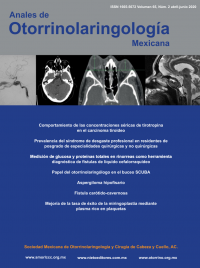Is it useful to study the mutation A1555G in the MTRNR1 mitochondrial DNA gene in patients with Ménière’s disease that require intratympanic gentamicin?

An Orl Mex. 2019 abril-junio;64(2):49-51.
Nathalia Castillo-Ledesma, Aiara Viana-Cora, Eugenia López-Simón, Patricia Corriols-Noval, Carmelo Morales-Angulo
Departamento de Otorrinolaringología, Hospital Universitario Marqués de Valdecilla, Santander, España.
Resumen
ANTECEDENTES: El 15% de pacientes con enfermedad de Ménière tienen mal control de sus síntomas con tratamiento médico y precisan tratamientos invasivos. La inyección intratimpánica de gentamicina es uno de los tratamientos más prescritos en la enfermedad de Ménière que no responde a tratamiento médico. La existencia de la mutación A1555G del gen MTRNR1 es frecuente en España. Los pacientes portadores de la misma tienen alta susceptibilidad al efecto ototóxico de los aminoglucósidos.
OBJETIVO: Determinar si es útil realizar un análisis genético para detectar la mutación A1555G del ADN mitocondrial en pacientes con enfermedad de Ménière que serán tratados con gentamicina intratimpánica para evitar la posible ototoxicidad asociada con esa mutación.
MATERIAL Y MÉTODO: Estudio prospectivo, transversal, observacional, realizado de 2013 a 2015, en el que se incluyeron pacientes con enfermedad de Ménière definitiva, seguidos entre 6 meses y 12 años. Se les realizó estudio genético para determinar si eran portadores de la mutación A1555G del gen MTRNR1.
RESULTADOS: Se incluyeron 40 pacientes, ninguno tuvo la mutación A1555G del gen MTRNR1. Siete tenían antecedentes familiares de hipoacusia (dos por vía materna).
CONCLUSIONES: No es indicado realizar un estudio genético de forma sistemática a pacientes con enfermedad de Ménière en ausencia de antecedentes familiares de ototoxicidad medicamentosa o de hipoacusia por vía materna.
PALABRAS CLAVE: Enfermedad de Meniére; hipoacusia; gentamicina; ADN mitocondrial.
Abstract
BACKGROUND: About 15% of patients with Meniere’s disease have poor control of their symptoms with medical treatment and require invasive treatments. Intratympanic gentamicin injection is one of the most widely used in Meniere’s disease unresponsive to medical treatment.
OBJECTIVE: To determine whether it is useful to conduct a study to find the mutation A1555G in the MTRNR1 mitochondrial DNA gene in Ménière’s disease patients who will be treated with intratympanic gentamicin.
MATERIAL AND METHOD: A prospective, cross-sectional, observational study, done from 2013 to 2015, including patients with definite Meniere’s disease, followed from 6 months to 12 years. A genetic study was performed to all them to find if they had the A1555G mutation of the MTRNR1 gene.
RESULTS: There were included 40 patients. No patient had the A1555G mutation in the MTRNR1 gene. Seven patients had a family history of hearing loss (2 maternally).
CONCLUSIONS: It is not indicated to make a routine genetic study to patients with Meniere’s disease in the absence of a family history of ototoxic drug or maternal hearing loss.
KEYWORDS: Meniere’s disease; Hearing loss; Gentamicin; Mitochondrial DNA.

